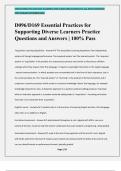EMILLYCHARLOTTE 2024/2025 ACADEMIC YAER ©2024 EMILLYCHARLOTTE. ALL RIGHTS RESERVED
FIRST PUBLISH SEPTEMBER 2024
D096/D169 Essential Practices for
Supporting Diverse Learners Practice
Questions and Answers | 100% Pass
Acquisition-Learning Hypothesis - Answer✔✔-The Acquisition-Learning hypotheses Two independent
systems of foreign language performance: 'the acquired system' and 'the learned system'. The 'acquired
system' or 'acquisition' is the product of a subconscious process very similar to the process children
undergo when they acquire their first language. It requires meaningful interaction in the target language
- natural communication - in which speakers are concentrated not in the form of their utterances, but in
the communicative act. The "learned system" or "learning" is the product of formal instruction and it
comprises a conscious process which results in conscious knowledge 'about' the language, for example
knowledge of grammar rules. A deductive approach in a teacher-centered setting produces "learning",
while an inductive approach in a student-centered setting leads to "acquisition". According to Krashen
'learning' is less important than 'acquisition'.
English Learner - Answer✔✔-a student who is in the process of acquiring English and has a first language
other than or in addition to English.
Formative Assessment - Answer✔✔-administered throughout a unit, aligned with KUDs, can use a
variety of formats, meant to help the teacher understand how each student is progressing, rarely graded.
Summative Assessment - Answer✔✔-used at the end of key segments and the end of a unit, aligned
with KUDs, determine the level of mastery each student has achieved with the KUDs at the end of unit,
can use closed formats or performance formats, typically graded.
Page 1/15
, EMILLYCHARLOTTE 2024/2025 ACADEMIC YAER ©2024 EMILLYCHARLOTTE. ALL RIGHTS RESERVED
FIRST PUBLISH SEPTEMBER 2024
1. Timing/scheduling accommodations for assessments - Answer✔✔-multiple testing sessions, rest
breaks extended time to complete tests
Setting accommodations for assessments - Answer✔✔-small group, separate location, in a carrel, special
lighting, acoustics, at the student's home, hospital, individual testing stations, special furniture, minimal
distractions
Presentation accommodations for assessments - Answer✔✔-large print exams, Braille, directions read
aloud, test given by person familiar to child, directions in simplified language, directions repeated,
additional examples provided, size share or location of the space for answers altered, noise buffers worn
by student
Response accommodations for assessments - Answer✔✔-marks answers in test booklets, by machine,
large-spaced paper, dictates answers, signs or points as alternative responses, spelling, punctuation and
paragraphing requirements waived, use of response aids such a abacus, arithmetic table, etc, calculator,
spell-check device
What is Progress monitoring? - Answer✔✔-provides essential data that helps teachers know what
students are learning, whether they are on track to master IEP goals, and how their performance
compares to that of their peers. can also provide valuable information to teachers to inform instruction
and differentiate learning.
Ways teachers can use assessment data to inform instruction - Answer✔✔-1. Differentiate instruction by
student readiness.
2. Set academic goals.
3. Evaluate programs and target professional development.
Page 2/15




